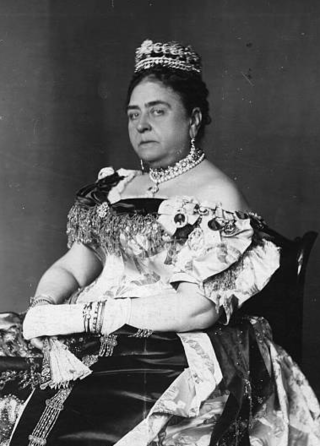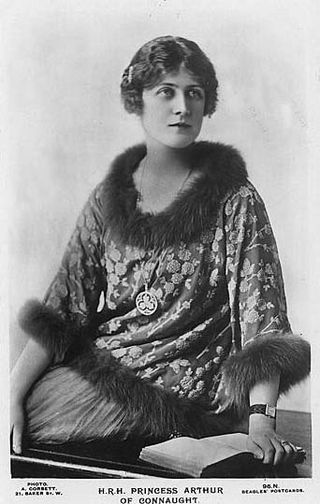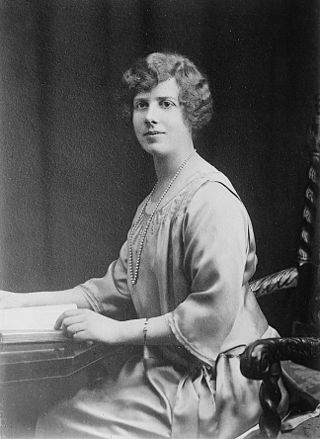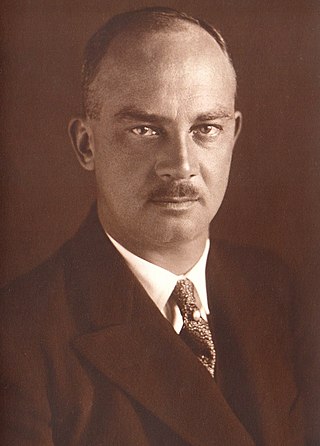
Morganatic marriage, sometimes called a left-handed marriage, is a marriage between people of unequal social rank, which in the context of royalty or other inherited title prevents the principal's position or privileges being passed to the spouse, or any children born of the marriage. The concept is most prevalent in German-speaking territories and countries most influenced by the customs of the German-speaking realms.
The grand ducal family of Luxembourg constitutes the House of Luxembourg-Nassau, headed by the sovereign grand duke, and in which the throne of the grand duchy is hereditary. It consists of heirs and descendants of the House of Nassau-Weilburg, whose sovereign territories passed cognatically from the House of Nassau to the House of Bourbon-Parma, itself a branch of the Spanish royal house which is agnatically a cadet branch of the House of Capet that originated in France, itself a derivative dynasty from the Robertians and the Karlings and the founding house of the Capetian dynasty.

The House of Windsor is a British royal house, and currently the reigning house of the United Kingdom and the other Commonwealth realms. The royal house's name was inspired by the historic Windsor Castle estate. Since it was founded on 17 July 1917, there have been five British monarchs of the House of Windsor: George V, Edward VIII, George VI, Elizabeth II, and Charles III. The children and male-line descendants of Queen Elizabeth II and Prince Philip also genealogically belong to the House of Oldenburg since Philip was by birth a member of the Glücksburg branch of that house.

The House of Hanover is a European royal house with roots tracing back to the 17th century. Its members, known as Hanoverians, ruled Hanover, Great Britain, Ireland, and the British Empire at various times during the 17th to 20th centuries. Originating as a cadet branch of the House of Welf in 1635, also known then as the House of Brunswick-Lüneburg, the Hanoverians ascended to prominence with Hanover's elevation to an Electorate in 1692. In 1714 George I, prince-elector of Hanover and a descendant of King James VI and I, assumed the throne of Great Britain and Ireland, marking the beginning of Hanoverian rule over the British Empire. At the end of his line, Queen Victoria's death in 1901, the throne of the United Kingdom passed to her eldest son Edward VII, a member of the House of Saxe-Coburg and Gotha, through his father Albert, Prince Consort. The last reigning members of the House of Hanover lost the Duchy of Brunswick in 1918 when Germany became a republic and abolished royalty and nobility.

The Royal Marriages Act 1772 was an Act of the Parliament of Great Britain which prescribed the conditions under which members of the British royal family could contract a valid marriage, in order to guard against marriages that could diminish the status of the royal house. The right of veto vested in the sovereign by this Act provoked severe adverse criticism at the time of its passage.

Princess Mary Adelaide of Cambridge, later known as the Duchess of Teck, was a member of the British royal family. She was one of the first royals to patronise a wide range of charities and was a first cousin of Queen Victoria.

Princess Alexandra, 2nd Duchess of Fife, born Lady Alexandra Duff and known as Princess Arthur of Connaught after her marriage, was the eldest surviving grandchild of Edward VII and also the first cousin of Edward VIII and George VI. Alexandra and her younger sister, Maud, had the distinction of being the only female-line descendants of a British sovereign officially granted both the title of Princess and the style of Highness.

Princess Caroline Louise Marguerite of Monaco is Princess of Hanover by marriage to Prince Ernst August. As the eldest child of Rainier III, Prince of Monaco, and Grace Kelly, she is the elder sister of Albert II, Prince of Monaco, and Princess Stéphanie.

Maud Carnegie, Countess of Southesk, titled Princess Maud from 1905 to 1923, was a granddaughter of Edward VII. Maud and her elder sister, Alexandra, had the distinction of being the only female-line descendants of a British sovereign officially granted both the title of Princess and the style of Highness.

George V was the last king of Hanover, reigning from 18 November 1851 to 20 September 1866. The only child of King Ernest Augustus and Queen Frederica, he succeeded his father in 1851. George's reign was ended by the Austro-Prussian War, after which Prussia annexed Hanover.

Ernest Augustus ; 17 November 1887 – 30 January 1953) was Duke of Brunswick from 2 November 1913 to 8 November 1918. He was a grandson of George V of Hanover, thus a Prince of Hanover and a Prince of the United Kingdom. He was also a maternal grandson of Christian IX of Denmark and the son-in-law of German Emperor Wilhelm II. The Prussians had deposed King George from the Hanoverian throne in 1866, but his marriage ended the decades-long feud between the Prussians and the Hanoverians.
Royal Highness is a style used to address or refer to some members of royal families, usually princes or princesses. Kings and their female consorts, as well as queens regnant, are usually styled Majesty.

Prince of the United Kingdom of Great Britain and Northern Ireland is a royal title normally granted to sons and grandsons of reigning and past British monarchs, plus consorts of female monarchs. The title is granted by the reigning monarch, who is the fount of all honours, through the issuing of letters patent as an expression of the royal will.

The use of the title of Princess of the United Kingdom of Great Britain and Northern Ireland is entirely at the will of the sovereign, and is now expressed in letters patent. Individuals holding the title of princess will usually also be granted the style of Her Royal Highness (HRH). The current letters patent were issued in 1917 during World War I, with one extension in 2012.

The Kingdom of Hanover was established in October 1814 by the Congress of Vienna, with the restoration of George III to his Hanoverian territories after the Napoleonic era. It succeeded the former Electorate of Hanover, and joined 38 other sovereign states in the German Confederation in June 1815. The kingdom was ruled by the House of Hanover, a cadet branch of the House of Welf, in personal union with Great Britain between 1714 and 1837. Since its monarch resided in London, a viceroy, usually a younger member of the British royal family, handled the administration of the Kingdom of Hanover.

Succession to the British throne is determined by descent, sex, legitimacy, and religion. Under common law, the Crown is inherited by a sovereign's children or by a childless sovereign's nearest collateral line. The Bill of Rights 1689 and the Act of Settlement 1701 restrict succession to the throne to the legitimate Protestant descendants of Sophia of Hanover who are in "communion with the Church of England". Spouses of Catholics were disqualified from 1689 until the law was amended in 2015. Protestant descendants of those excluded for being Roman Catholics are eligible.

Princess Alexandra of Hanover is a Monegasque figure skater and the fourth child of Princess Caroline of Monaco and the third of Ernst August, Prince of Hanover.

Princess is a title used by a female member of a monarch's family or by a female ruler. The male equivalent is a prince. Most often, the term has been used for the consort of a prince, or for the daughter of a monarch. A crown princess can be the heir apparent to the throne or the spouse of the heir apparent.

The Danish royal family is the dynastic family of the monarch of Denmark. While some members of the Danish royal family hold the title of Prince(ss) of Denmark, descendants of Margrethe II additionally bear the title Count(ess) of Monpezat. Children of the monarch are accorded the style of His/Her Royal Highness. The King and Queen are styled Majesty.
This is a list of Hanoverian princes from the accession of George III to the throne of the Kingdom of Hanover in 1814. Individuals holding the title of prince will usually also be styled "His Royal Highness" (HRH). The wife of a Hanoverian prince will usually take the title and style of her husband. Despite Hanover's annexation by Prussia in 1866, male-line descendants of George III continue to style themselves as a prince or princess of Hanover.
















